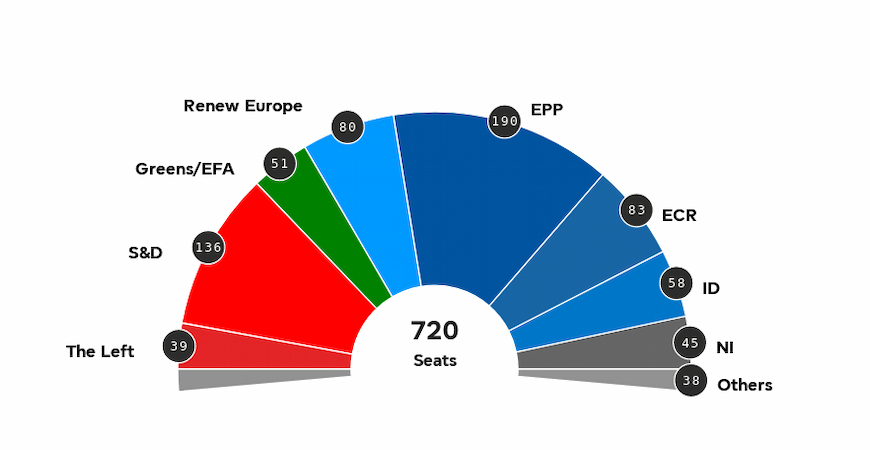A worrying shift to the right for the future of Europe and Emmaus
On 9 June 2024, Europeans headed to the ballot boxes to elect their MEPs for the next five years. The results are clear: the conservative right has been significantly strengthened and the far right has gained ground. In contrast, all of the left-wing parties have lost seats, with the green parties hardest hit with a loss of 19 seats.
Within our movement, we firmly believe in a greener, more supportive and inclusive Europe. However, depending on the composition of future alliances between political groups, these choices may jeopardise our efforts to build a fairer society.
An alarming surge by the far right
In France, Italy, Austria and Hungary, far-right parties came out on top in the elections. In other countries, such as Germany, the Netherlands, Poland, Romania, Belgium, the Czech Republic and Latvia, they took second place.
At the European level, there are two far-right parties (ID and ECR), which obtained a total of 141 out of 720 seats. Although they have not yet formed an alliance, this option cannot be ruled out. These two parties are now the third and fifth most represented in the European Parliament. However, together they would constitute the second largest political force. In addition, around 90 elected MEPs have not yet joined political parties. Although these MEPs are currently unaffiliated, they broadly identify with far-right ideas.
The far right’s agenda is clearly the opposite of ours when it comes to Emmaus’ issues: putting the EU Pact on Migration and Asylum back on the table to make it even more restrictive for potential migrants, challenging the Green Pact and reducing pressure on Vladimir Putin.
A major strengthening of the European right
The major winners of these elections are without a doubt the members of the political group of the European conservative right (EPP). With a minimum of 190 out of 720 seats, they now form the largest political group in the European Parliament. The message sent to Europe is clear in terms of this party’s priorities: putting growth and a competitive economy first, focusing on insecurity, less attention on the environment and little focus on social issues.
A glimmer of hope?
In the Netherlands, although the far right won the general election at the start of the year, the alliance of social democrat and green groups came out on top at the European elections. In Finland, the far right only won a single seat and were ranked sixth, despite their presence in government. In Portugal, the social democrats dominated the elections, with the far right only winning two seats out of twenty-one. In Sweden, the social democrats took first place, relegating the far right to fourth position, with only three seats out of twenty-one. In Denmark, the social democrats and greens came top, while the far right finished in fifth place with a single seat.
Awaiting the formation of alliances and nominations for top jobs
MEPs must now form political groups before the next plenary session of the European Parliament which will be held on 16 July. On this occasion, they will choose the theme-based committees on which they will sit.
The European heads of state are expected to present their candidate for the presidency of the European Commission at the plenary on 28 July. It will be up to Members of Parliament to decide whether or not to validate this choice.
Once elected, the president will have the task of composing the College of Commissioners, made up of 27 commissioners appointed by the Member States, one from each country. The European Parliament will have the opportunity to hold hearings with its future commissioners and is expected to vote on whether or not to approve this choice in October.
The outgoing commission president, Ursula Von der Leyen, is in the running to be re-elected. Although she comes from the ranks of the EPP conservative right, she supported the Green Pact at a time when parties supporting environmental issues were a more significant political force. Will she turn her back on these issues given the new composition of Parliament?

Source: Provided by Verian for the European Parliament. Credit: European Parliament.



